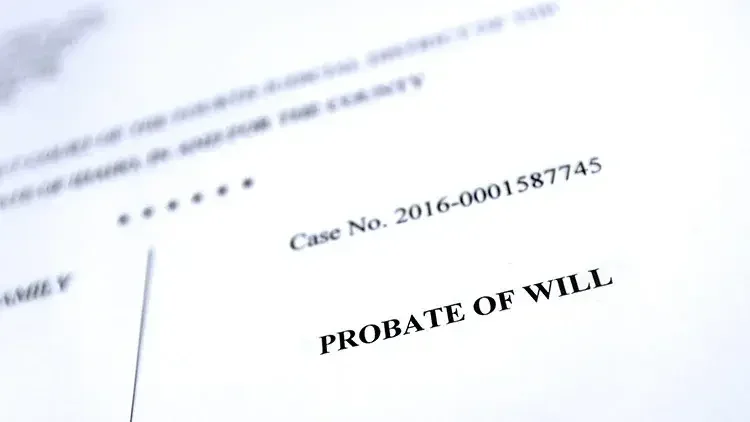Probate court is a specialized type of court that deals with the property and debts of a person who has died.
The basic role of the probate court judge is to ensure that the deceased person’s creditors are paid, and that any remaining assets are distributed to the proper beneficiaries.

What is probate?
Probate is a legal procedure by which a court oversees the distribution of the property of a person who has died. Many states have a specialized probate court.
In some states, it is called by other names, such as Surrogate’s Court, Orphan’s Court, or Chancery Court.
The court appoints someone to take control of the deceased person’s assets, ensure that all debts are properly paid, and distribute the remaining property to the proper beneficiaries.
Probate without a will
When a person dies without a will, the property is distributed to the deceased person’s next of kin, as determined by the state’s probate law. This part of the probate law is known as the law of intestate succession.
It outlines the order in which the next of kin inherit. A surviving spouse gets a share of the decedent's property. The law further breaks down the order in which grandchildren, siblings, parents, and aunts and uncles inherit.
The details vary from state to state. In a sense, the law of intestate succession can be considered to be the “will” the state makes for you if you don’t make your own.
Probate with a will
When a person dies with a will (most often titled a last will and testament), the property is distributed to the people or organizations (such as charities) the will designates to receive it.
To probate a will, the court must also make a determination that the will is valid. If someone contests the validity of the will, the court will decide the matter.
In all states, even if there is a will, a surviving spouse is entitled to a certain share of the property. This is called the surviving spouse’s elective share, and the amount of the share varies by state.
In community property states, barring a separate agreement between spouses, one-half of the property earned by the couple during marriage belongs to the surviving spouse, and the will dictates how the decedent's share of the community property and the decedent's separate property are distributed.

The probate process
The probate process begins with someone filing a petition for probate with the probate court. This is usually done by a relative or someone designated in a will. If there is a will, a copy of the will must also be filed (unless it has already been filed in one of the states allowing filing prior to death). Some states provide official probate court forms.
The court will then issue an order appointing someone to represent the estate. Generally, this person is called a personal representative or executor, but may also be called an administrator if there is no will, and an executor if there is a will. Most, if not all, wills designate someone to fill that role.
The personal representative is responsible for handling the administration of the estate. This involves such things as:
- Opening an estate bank account
- Arranging for the publication of legal notices in a newspaper
- Determining the validity of claims by creditors and paying them (especially the funeral costs and final medical bills)
- Sending notices to beneficiaries
- Selling assets if necessary
- Filing court documents
- Filing a final tax return for the deceased person
- Transferring assets to the beneficiaries.
Often, the personal representative hires a probate lawyer to assist in some of these tasks.
The cost of probate
The costs of probate include, among other things, court filing fees, costs for publishing notices in newspapers, and attorneys’ and executors' fees. If the estate is complex, there may also be fees for an accountant. Fees for a probate attorney may be based on an hourly rate, a percentage of the value of the estate, or a combination of these.
A probate can take months or even years to complete. For an average modest estate, it can take from six months to two years. The longer it takes, the more it costs. If any heirs contest a will, things get more time-consuming and expensive.
Probate makes the deceased person’s financial situation a matter of public record. This includes the nature and extent of the assets, the person’s debts, and who will get the assets.

Simplified probate procedures
Many states have a simplified procedure for estates under a certain value, for certain types of property, or if everything is left to a surviving spouse.
Probate and taxes
Many states require the payment of some form of tax, typically based upon the value of the assets in the probate estate, usually referred to as an estate tax or an inheritance tax. Some states only assess the tax if the value of the estate exceeds a certain amount.
If the value of the estate exceeds a certain value, the federal Unified Gift and Estate Tax may come into play. The dollar amounts that trigger this tax vary from year to year. For 2015, an estate must exceed a value of $5.42 million for the tax to apply.
Probate and lawyers
For fairly simple estates, with or without a will, it may be possible to go through probate without a lawyer. However, many estates are more complex than they initially appear. The guidance of a qualified probate attorney can get you through the process quicker, help deal with problems that may arise, ensure the taxes are handled properly, and ease your stress.
Avoiding probate
Due to much of what is explained above, many people seek ways to either avoid probate or to minimize the amount of their property that will be subject to probate.
This can be accomplished by restructuring the manner in which property is held and holding assets in a living trust. Some techniques to avoid probate may be considered a gift under the federal Unified Gift and Estate Tax.
The federal gift return may be required if more than $14,000 is given to any one person in any one year.
Because probate can rarely be entirely avoided, a basic understanding of probate law is essential to making any estate plan.

